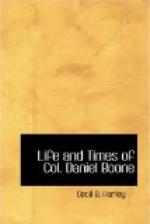The intelligence of the siege of Bryant’s Station had spread far and wide, and the whole region round was in a state of intense excitement. The next morning after the enemy’s retreat, reinforcements began to arrive, and in the course of the day successive bodies of militia presented themselves, to the number of one hundred and eighty men.
Among this number was Colonel Daniel Boone, his son Israel, and his brother Samuel, with a strong party of men from Boonesborough. Colonel Stephen Trigg led a similar corps from Harrodsburg; and Colonel John Todd headed the militia from Lexington. Majors Harland, McGary, McBride, and Levi Todd were also among the arrivals.[43]
It is said that nearly one-third of the whole force assembled at Bryant’s Station were commissioned officers, many of whom had hurried to the relief of their countrymen. This superior activity is to be accounted for by the fact that the officers were generally selected from the most active and skillful of the pioneers.
A consultation was held in a tumultuous manner, and it was determined to pursue the enemy at once. The Indians had retreated by way of the Lower Blue Licks. The pursuit was commenced without waiting for the junction of Colonel Logan, who was known to be coming up with a strong reinforcement. The trail of the enemy exhibited a degree of carelessness very unusual in an Indian retreat. Various articles were strewn along the path, as if in terror they had been abandoned. These symptoms, while they increased the ardor of the young men, excited the apprehensions of the more experienced borderers, and Boone in particular. He noticed that, amid all the signs of disorder so lavishly displayed, the Indians seemed to take even unusual care to conceal their numbers by contracting their camp. It would seem that the Indians had rather overdone their stratagem. It was very natural to those not much experienced in Indian warfare to suppose that the articles found strewn along the road had been abandoned in the hurry of flight; but when they found that the utmost pains had been taken to point out the way to them by chopping the trees, one would have thought that the rawest among them, who had only spent a few months on the border, could have seen through so transparent an artifice. But these indications were disregarded in the desire felt to punish the Indians for their invasion.
Nothing was seen of the enemy till the Kentuckians reached the Blue Licks. Here, just as they arrived at Licking River, a few Indians were seen on the other side, retreating without any appearance of alarm. The troops now made a halt, and the officers held a consultation to determine on the course to be pursued. Colonel Daniel Boone, on being appealed to as the most experienced person present, gave his opinion as follows:




